12 Notable Moments From The Lie of the Land
Mark McCullough makes his choices from the eighth episode of Series 10.
The Lie of the Land sees the final part of what should have been an epic trilogy at the heart of the tenth series of Doctor Who. It’s certainly been memorable, not least from my point of view covering these articles; with one written in a lecture theatre, another during a road trip across England, and this final instalment on a plane to Berlin. Relevance? A lot can happen in a fourteen-day period and that does leave The Lie of the Land feeling rather detached from Extremis where the story began. As an episode, it needs to be looked at in two regards, how it performs as a story in its own right, and how it concludes the story of the Monks. Unfortunately, it is this reviewer’s opinion that the latter hinders the former. For that reason, I have opted for twelve moments that go through the episode sequentially to hopefully provide an analysis that is fair to the efforts of Toby Whithouse whilst still detailing some of my disappointments towards the episode/trilogy.
12. The Reign of the Monks
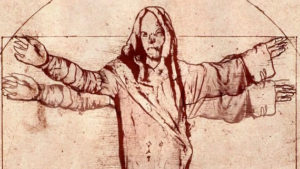
11. Bill Remembers
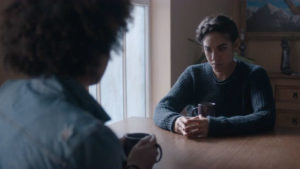 With the bleak opening to the episode there was a great awareness from the narrative that they needed to establish something quickly to infuse hope back into the situation. This comes in the form of a highly emotional scene where Bill discusses The Lie of the Land with her mother. In this scene, we learn of her guilt over her actions at the end of The Pyramid at the End of the World, and her undying faith in the Doctor to pull though and fix her mistake. Perhaps an apt description of this story is a cruel one, as on reflection this scene becomes more of an emotional gut punch when we learn that Bill’s mum is essentially just a coping mechanism for her, a projection which she can verbalise with to ease the pain which accompanies her attempts to resist the Monks and retain her memories. With the Doctor absent it is a well utilised opportunity to further develop a companion who undoubtedly at this stage had more agency than any of her predecessors.
With the bleak opening to the episode there was a great awareness from the narrative that they needed to establish something quickly to infuse hope back into the situation. This comes in the form of a highly emotional scene where Bill discusses The Lie of the Land with her mother. In this scene, we learn of her guilt over her actions at the end of The Pyramid at the End of the World, and her undying faith in the Doctor to pull though and fix her mistake. Perhaps an apt description of this story is a cruel one, as on reflection this scene becomes more of an emotional gut punch when we learn that Bill’s mum is essentially just a coping mechanism for her, a projection which she can verbalise with to ease the pain which accompanies her attempts to resist the Monks and retain her memories. With the Doctor absent it is a well utilised opportunity to further develop a companion who undoubtedly at this stage had more agency than any of her predecessors.
10. Nardole and Bill Reunited
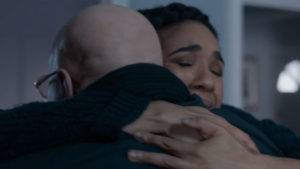 We were treated to a rare comic moment against the bleak backdrop established by Whithouse in the early stage of the narrative via the reunion of two of our protagonists. This comes immediately after the scene of Bill talking to ‘her mother’ and catches her a bit off guard. There is a tense moment where the two question each other’s identity further highlighting the uncertainty and unfamiliarity of this new world we are presented with. Nardole’s fate at the end of last week’s outing is also addressed here providing a satisfactory answer and to explain why Bill has been left on her own. The scene is also used to introduce the concept of the Doctor having turned to the Monks side and that he is being held in a secure location. The relationship between Nardole and Bill is an unexpected highlight of the series thus far, and the scenes they share always seem to have a knack of making me smile.
We were treated to a rare comic moment against the bleak backdrop established by Whithouse in the early stage of the narrative via the reunion of two of our protagonists. This comes immediately after the scene of Bill talking to ‘her mother’ and catches her a bit off guard. There is a tense moment where the two question each other’s identity further highlighting the uncertainty and unfamiliarity of this new world we are presented with. Nardole’s fate at the end of last week’s outing is also addressed here providing a satisfactory answer and to explain why Bill has been left on her own. The scene is also used to introduce the concept of the Doctor having turned to the Monks side and that he is being held in a secure location. The relationship between Nardole and Bill is an unexpected highlight of the series thus far, and the scenes they share always seem to have a knack of making me smile.
9. Breaking into the Ship
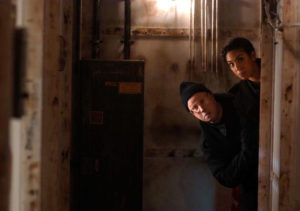 In an episode with relatively few action moments, the scene where Bill and Nardole sneak their way onto the ship where the Doctor is being held offers something to deliver this. The monologue from Bill to her mother that is superimposed on the scenes is extremely effective allowing for more information about the world to be delivered in a manner that avoids an information dump. The scene also features the first true appearance in the episode of the Monks and utilises them well enough to create a tense uncomfortable atmosphere around them. The visuals of the boat and stormy seas also make for spectacular viewing which helps to increase the scale of the story contributing to the cinematic feel of the first act of the story.
In an episode with relatively few action moments, the scene where Bill and Nardole sneak their way onto the ship where the Doctor is being held offers something to deliver this. The monologue from Bill to her mother that is superimposed on the scenes is extremely effective allowing for more information about the world to be delivered in a manner that avoids an information dump. The scene also features the first true appearance in the episode of the Monks and utilises them well enough to create a tense uncomfortable atmosphere around them. The visuals of the boat and stormy seas also make for spectacular viewing which helps to increase the scale of the story contributing to the cinematic feel of the first act of the story.
8. The Confrontation
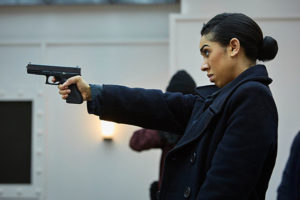 If I were to approach this list in a traditional way we would have an undisputed winner, in fact I was thinking as much whilst watching the scene unfold. However for reasons that come next, that did not end up being the case. With the scene set in truly fascinating fashion we see Bill confront the Doctor about his working with the Monks. The surprise conveyed on Pearl Mackie’s face when the Doctor continually rebuts her suggestions that he is undercover drives home just how jaw dropping this twist was. The possibilities of an episode where the Doctor was the enemy was such a tantalising prospect and this scene a mere snippet of the drama that such a subversion of normality could produce. The tension was at an all-time high as Bill called out the Doctor, only for him to betray her and inform the Monks. This led to her making a tough decision to steal one of the guard’s weapons and take out a Doctor: a brave companion defining moment. Undoubtedly the highlight of the series so far.
If I were to approach this list in a traditional way we would have an undisputed winner, in fact I was thinking as much whilst watching the scene unfold. However for reasons that come next, that did not end up being the case. With the scene set in truly fascinating fashion we see Bill confront the Doctor about his working with the Monks. The surprise conveyed on Pearl Mackie’s face when the Doctor continually rebuts her suggestions that he is undercover drives home just how jaw dropping this twist was. The possibilities of an episode where the Doctor was the enemy was such a tantalising prospect and this scene a mere snippet of the drama that such a subversion of normality could produce. The tension was at an all-time high as Bill called out the Doctor, only for him to betray her and inform the Monks. This led to her making a tough decision to steal one of the guard’s weapons and take out a Doctor: a brave companion defining moment. Undoubtedly the highlight of the series so far.
7. The Bait and Switch
 Right from the next time trailer, there was an increased hype about this week’s outing because of the tease of the Doctor regenerating. Obviously, anyone who has been following the news around the series knew that this was going to be little more than trailer bait as Capaldi is scheduled to appear right up until the Christmas special. Unfortunately, the way in which this bait and switch is delivered is a genuine contender for worst moment of the series as so much more than just a regeneration tease is wasted by a moment of madness from the narrative. Having already established the idea of a world under the oppression of the Monks, and the added tantalising detail of the Doctor being turned to their side, the episode looked set to press into unexplored territory and become something truly memorable. Instead the scene we were given consisted of the Doctor putting Bill through huge emotional trauma to essentially turn around and say, ‘it was only a joke to test you were on my side’. Not once does the Doctor consider what impact his actions could have on his friend. Not once does he apologise for his actions, and not once does the narrative address it afterwards. In terms of characterisation of the Doctor, I feel his actions here are about as wrong as possible, it’s unnecessarily cruel, and that is something the Doctor never is. Despite the fact, the events on the boat aren’t referenced again, it proves a turning point in the narrative where the entire story decides it wants to be something else to what it appeared to start out as. It’s a rather disjointed experience and very disappointing after how strong and unique the first act was.
Right from the next time trailer, there was an increased hype about this week’s outing because of the tease of the Doctor regenerating. Obviously, anyone who has been following the news around the series knew that this was going to be little more than trailer bait as Capaldi is scheduled to appear right up until the Christmas special. Unfortunately, the way in which this bait and switch is delivered is a genuine contender for worst moment of the series as so much more than just a regeneration tease is wasted by a moment of madness from the narrative. Having already established the idea of a world under the oppression of the Monks, and the added tantalising detail of the Doctor being turned to their side, the episode looked set to press into unexplored territory and become something truly memorable. Instead the scene we were given consisted of the Doctor putting Bill through huge emotional trauma to essentially turn around and say, ‘it was only a joke to test you were on my side’. Not once does the Doctor consider what impact his actions could have on his friend. Not once does he apologise for his actions, and not once does the narrative address it afterwards. In terms of characterisation of the Doctor, I feel his actions here are about as wrong as possible, it’s unnecessarily cruel, and that is something the Doctor never is. Despite the fact, the events on the boat aren’t referenced again, it proves a turning point in the narrative where the entire story decides it wants to be something else to what it appeared to start out as. It’s a rather disjointed experience and very disappointing after how strong and unique the first act was.
6. The B*tch is Back
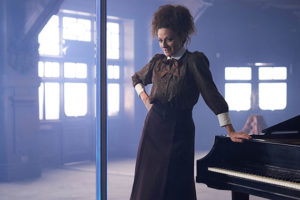 It’s always an absolute delight having Michelle Gomez as part of the show, her take on Missy is nothing short of perfection, stealing every scene she is in. Her delivery of her lines is always spot on, and the humour the character affords to the narrative brightens up any story she is in. This time out is the exception as it marks the first time the character has been under the pen of someone other than Moffat (although one expects he still had a considerable creative input) so it is great to see the character flourish for Whithouse. Technically this scene also makes up the reveal of the Vault arc culminating in Missy’s appearance, this does hold true given that Extremis featured flashbacks only. What she does within the narrative, she does extremely well. However…
It’s always an absolute delight having Michelle Gomez as part of the show, her take on Missy is nothing short of perfection, stealing every scene she is in. Her delivery of her lines is always spot on, and the humour the character affords to the narrative brightens up any story she is in. This time out is the exception as it marks the first time the character has been under the pen of someone other than Moffat (although one expects he still had a considerable creative input) so it is great to see the character flourish for Whithouse. Technically this scene also makes up the reveal of the Vault arc culminating in Missy’s appearance, this does hold true given that Extremis featured flashbacks only. What she does within the narrative, she does extremely well. However…
5. Missy Gives the Info (and very little else)
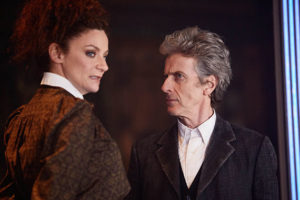 Having already stated how wonderful it is to have Missy back, and how great her scenes here were, I find myself having to change tact and ask another question entirely: What purpose did her character serve the narrative? Upon reflection, there’s very little that Missy actually does, yes she helps the Doctor come to realisations about the Monks, but arguably that’s something that comes from the Doctor himself anyway. What she does suggest about Bill having to die does little to raise the stakes especially in light of already having one cop out already with the pseudo-regeneration, so we know Bill will be safe. Arguably you could call this the physical Vault reveal, if so Bill’s reaction is surely indicative of the audiences’ who already know the contents of the vault. Normally the inclusion of arc content to an episode at this stage of the series is no issue, but here the episode suffers. Part of the reason here is how neglected the Monks are (more on that later) so the time spent with Missy for relatively little gain feel like they could have been spent a lot better dedicating a little love to the main narrative and ironing out a few of flaws within.
Having already stated how wonderful it is to have Missy back, and how great her scenes here were, I find myself having to change tact and ask another question entirely: What purpose did her character serve the narrative? Upon reflection, there’s very little that Missy actually does, yes she helps the Doctor come to realisations about the Monks, but arguably that’s something that comes from the Doctor himself anyway. What she does suggest about Bill having to die does little to raise the stakes especially in light of already having one cop out already with the pseudo-regeneration, so we know Bill will be safe. Arguably you could call this the physical Vault reveal, if so Bill’s reaction is surely indicative of the audiences’ who already know the contents of the vault. Normally the inclusion of arc content to an episode at this stage of the series is no issue, but here the episode suffers. Part of the reason here is how neglected the Monks are (more on that later) so the time spent with Missy for relatively little gain feel like they could have been spent a lot better dedicating a little love to the main narrative and ironing out a few of flaws within.
4. Defeated by Love
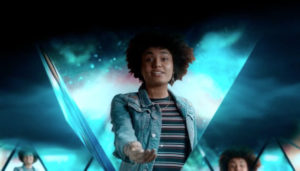 There’s a common trope within the show that is sure to get some flak from the fans, that trope is the concept of monsters being defeated by love (or another similar human emotion). Usually it’s the Cybermen on the receiving end with their reputation taking a hammering for it. Here the Monks receive the same treatment, but for once I’m happy to say it works, and not just well, almost perfectly. The denouement of the episode sees the Monks defeated by Bill’s love for her mother, not only does this give a huge payoff to the mentions of the special relationship between Bill and her mother throughout the series. Not just that but the addition here actually enriches all the episodes that have come before. Setting aside the significance of the relationship for a moment we can analyse what makes the resolution fit so well. The Monks desire was to be loved by the people they ruled, and they were using Bill to transmit false memories to humanity to ensure this love. So logically the best way for them to be displaced is by a greater love, and what more natural a way to this than through the pure image of Bill’s mother which she has crafted entirely from a place of love. For this reason, the resolution feels well-earned and represents a piece of intelligent writing.
There’s a common trope within the show that is sure to get some flak from the fans, that trope is the concept of monsters being defeated by love (or another similar human emotion). Usually it’s the Cybermen on the receiving end with their reputation taking a hammering for it. Here the Monks receive the same treatment, but for once I’m happy to say it works, and not just well, almost perfectly. The denouement of the episode sees the Monks defeated by Bill’s love for her mother, not only does this give a huge payoff to the mentions of the special relationship between Bill and her mother throughout the series. Not just that but the addition here actually enriches all the episodes that have come before. Setting aside the significance of the relationship for a moment we can analyse what makes the resolution fit so well. The Monks desire was to be loved by the people they ruled, and they were using Bill to transmit false memories to humanity to ensure this love. So logically the best way for them to be displaced is by a greater love, and what more natural a way to this than through the pure image of Bill’s mother which she has crafted entirely from a place of love. For this reason, the resolution feels well-earned and represents a piece of intelligent writing.
3. Tweaking the Doctor Master Relationship
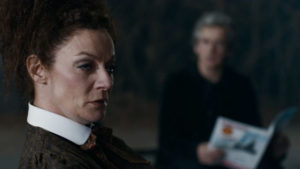
2. The Monks

1. Loose Trilogy vs Traditional Trilogy
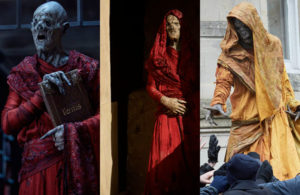
Conclusion
I’ve covered a lot in this analysis, both positive and negative. There’s nothing more frustrating than episode which has the potential to be a classic, but doesn’t quite reach those heights for a few reasons. For that reason, my opinion towards the episode is very hot and cold, as a result this article may appear a bit disjointed, hence the need for a conclusion. The best way to describe the Monk trilogy is as an experiment. To call it a failed one would be harsh as it had its moments, but the episodes would probably have fared better alone. Still credit where it’s due to Moffat, Harness and Whithouse for being brave enough to try it.








